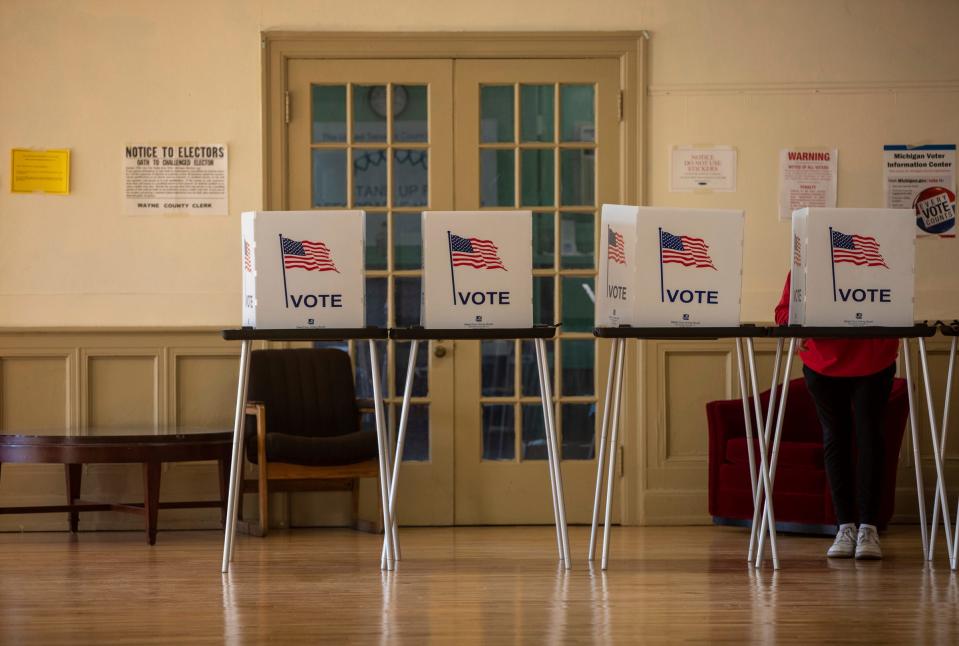Eliminating property taxes in Michigan would devastate communities, experts say
An effort to eliminate property taxes in Michigan would devastate communities and wreak havoc on the state's economy, according to municipal finance experts.
The "AxMITax" campaign seeking a spot on the November ballot characterizes its proposed amendment to the state constitution as a way to end tax foreclosure and rein in government spending. At its heart lies a vision that taxpayers should support only the public services they use.
"If I want to go to the gym, nobody pays my gym membership," said Karla Wagner, a Cannon Township resident who launched AxMITax after helping GOP gubernatorial candidate Ryan Kelley's campaign.
Wagner said she didn't craft the AxMITax proposal with the aim of defunding public services. But that's the outcome some anticipate.
Tony Minghine — deputy executive director of external strategies for the Michigan Municipal League — forecasts hits to parks, libraries, schools and more that would either force them to close or operate as unrecognizable shells of what they look like now.
"It would absolutely decimate local government as we know it," he said.
Local governments in Michigan rely heavily on local property tax revenues from residents and businesses. Collectively, they brought in $15 billion for the 2021-22 fiscal year, according to data from the Citizens Research Council of Michigan. The state collected nearly $3 billion in property tax revenue on top of that.
"So adoption of this constitutional amendment would put a $18 billion hole in state and local finances," said Eric Lupher, president of the Citizens Research Council. AxMITax proposes increasing state revenue sharing with county and local governments to help fill the gap. But it would restrict those funds to support "essential government and essential infrastructure services" such as public safety, fire protection and roads.
But that won't help local governments make up what they'll lose. "It can't backfill $15 billion dollars, and the amendment doesn't pretend that it should either," said Lupher.
Wagner pointed out examples of what she sees as unnecessary public spending such as a pickleball court and a walking trail. "Everybody from the state on down needs to cut their budgets a little bit," she said.
Inspiration for the property tax proposal
Wagner drew inspiration for her proposal from her own life. She predicts her elderly parents in their mid-80s may, at some point, no longer be able to afford to live in their home because of a property tax bill that supports services they don't use. She also pointed to her son, who sends five children to Christian school because he doesn't like the public school curriculum. "But yet, he has to support the public school," she said.
Wagner — a real estate agent — said she also worries about the number of homeowners who lose their property due to tax foreclosure.

Overall, she characterized property taxes in Michigan as holding back the state economy. "When the government takes all of our money, we have nothing to spend," she said. "We can't expand our businesses. We can't go out and buy things to generate sales tax." Wagner envisions the tax relief in her proposal will lure investment and spur population growth.
Michigan residents pay higher property taxes compared with those living in most other states. The Tax Foundation found Michigan residents paid the 14th highest property taxes in 2021, the year with the most recent available data. Lupher pointed out the limitations on levying local sales taxes and the state ban on levying local income taxes outside of cities as restricting the revenue options for local governments. "So when all you have is a property tax, that's all we lean on," he said.
Impact of "AxMITax" property tax amendment
The AxMITax proposal worries advocates for public services.
Michigan Community College Association President Brandy Johnson expects to see community colleges close in Michigan under the AxMITax proposal. "Without a doubt," she said. Community colleges in Michigan rely on three main buckets of funding: state appropriations, tuition and fees and local property taxes. "When you kick one leg of three-legged stool, the whole thing comes crumbling down," Johnson said. Some community colleges depend on property taxes for more than a third of their revenue.
"There's no way we could operate the college ... taking out almost 45% of our revenue," said Schoolcraft College President Glenn Cerny.
Libraries would face a similar fate, said Michigan Library Association Executive Director Deborah Mikula.
"It would be so cataclysmic that I'm not sure that they would survive," Mikula said. Libraries in the state receive an even larger share of their funding from local property taxes than community colleges.
Wagner said she's not trying to close down libraries or community colleges. Still, she sees a trade-off between funding public services and providing tax relief to keep people in their homes. "Show me the book in the library that's worth someone losing their home," she said.
Wagner who calls herself a "bookaholic" said she never goes to the library. She said she could use the taxes she pays to support her local library for any number of expenses such as paying off her truck. She proposed creating a membership fee to support libraries in lieu of property taxes.
Mikula noted that libraries provide much more than books. They offer access to high-speed internet, employment assistance, workspace, digital literacy support and more. "They're one of the last free and open public institutions that are in the heart of every single community in Michigan," she said. Voters regularly approve millages to keep their libraries open, according to Mikula.

With local public services impacted by the AxMITax proposal, Minghine envisions a Michigan where businesses and people won't want to locate. "I mean understand nobody gets excited about paying taxes," he said. "But at the same time, I think we all recognize to be a vibrant place, you have to provide services."
What's next for property tax proposal?
The AxMITax campaign will try to collect enough voter signatures to land a spot on the November ballot with a shoestring budget. Its latest campaign finance filing indicates the group ended the year with just $637.40 cash on hand. The group doesn't plan to pay for petition circulators and is instead relying on volunteers, Wagner said.
The AxMITax website listed six businesses across the state where voters can sign the petition as of Friday, according to the group's website. And Wagner also has travel planned across the state to deliver presentations on the proposal and ask voters to sign at events, with most listed as of Friday hosted by individuals and groups affiliated with the Republican Party and conservative groups.
AxMITax must file at least 446,198 valid voter signatures by July 8 to put the proposal to a statewide vote this fall.
While the group initially planned to obtain approval from the Board of State Canvassers of the summary language describing its proposal on the petition for collecting voter signatures, the group ultimately ditched those plans after prolonged back and forth over the summary language during multiple canvasser meetings. It didn't obtain approval of the petition form from the board either.
The approvals are optional under state election law. But without it, the campaign leaves itself vulnerable to disqualification due to misleading summary language or any defects found with its form.
Contact Clara Hendrickson: chendrickson@freepress.com or 313-296-5743. Follow her on X, previously called Twitter, @clarajanehen.
This article originally appeared on Detroit Free Press: Michigan property tax proposal cuts public service funding

